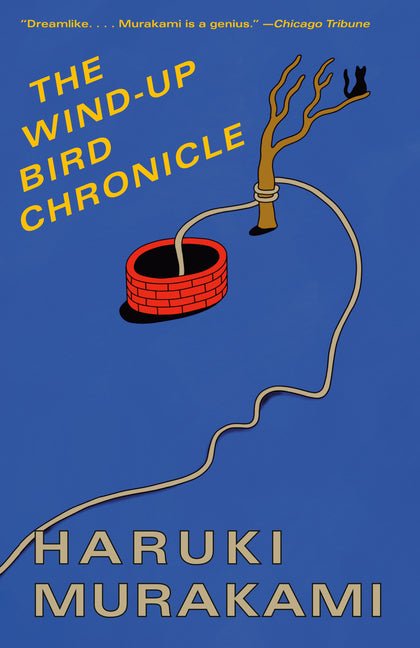Vintage
The Wind-Up Bird Chronicle
Couldn't load pickup availability
A "dreamlike and compelling” tour de force (Chicago Tribune)—an astonishingly imaginative detective story, an account of a disintegrating marriage, and an excavation of the buried secrets from Japan’s forgotten campaign in Manchuria during World War II.
Now with a new introduction by the author.
In a Tokyo suburb, a young man named Toru Okada searches for his wife’s missing cat—and then for his wife as well—in a netherworld beneath the city’s placid surface. As these searches intersect, he encounters a bizarre group of allies and antagonists. Gripping, prophetic, and suffused with comedy and menace, this is one of Haruki Murakami’s most acclaimed and beloved novels.
Share
Book Details
ISBN:
9780679775430
EAN:
9780679775430
Binding:
Paperback
Pages:
624
Authors:
Haruki Murakami
Publisher:
Vintage
Published Date: 1998-01-09
View full details
-Nothing happens.The thought always comes to mind when I think of "The Wind-Up Bird Chronicle". It's not literally true, but it is perhaps the quickest summary of what impresses me so much about the book. Tumultuous events surround Toru Okada, yet in the course of the book he rarely leaves his own neighborhood, and stays mostly in his own block. For a good part of the story it seems that he is a passive receptacle for the stories of the bizarre characters who enter his life. His wife disappears, and for a long time his only response seems to be waiting for others to help him.Nothing happens. Or: the journey is almost all internal. There is a stillness to Murakmi's story, a meditative quality that I haven't seen in any other contemporary fiction. This seems to me the novel's primary brilliance, for it is in stillness that Murakami is able to show the psychic chaos underlying what might be easily dismissed as straightforward events.Toru's path is never straight, but the next step is always clear. In this (and others of the book's elements) there are echoes of Lieutenant Slothrop from Gravity's Rainbow, but where Pynchon decides that such seemingly arbitrary movement can only end in dissolution, Murakami makes what seems to me a much braver choice, because it means that he needs to bring everything together in the end.A teacher of mine was once told (by a fellow writer at a conference in Argentina) that Americans misapprehended Magical Realism. "You have a complicated name for it," the writer said, "but really it's right out there in the hills." I think something similar can be said for Murakami's more "fantastic" elements; to me they seem anything but arbitrary. Some characters appear to drop out of the story, some plot lines to remain unresolved, but I don't think Murakami leaves pieces unfinished simply because he ran out of steam, or found the main plotline completed before he had a chance to tie up loose ends. The structure of the novel seems both deliberate and intelligent to me, although some of the important connections between events remain deeply implicit.Of course none of this is worth anything if the book doesn't move you. But this in my opinion is where Murakami makes his bravest decisions of all: in spite of the somewhat detached tones of Toru and the other characters, in spite of the clear tendency towards the kind of cynicism that is so popular in contemporary literary fiction, "The Wind-Up Bird Chronicle" ends up being a deeply emotional work. It has been very rare in the past few decades for a book to intelligently handle love as a primary element without resorting to some form of detachment; this book does it as well as any other I've read.
Shipped quickly, and the price was great so I can’t complain much. However, I was sent a different edition than what was portrayed. I selected this listing for the specific edition that was pictured, and was disappointed to get something different. Oh well, it’s a great novel. I’ll likely try again and gift this one to a friend.
Why such an amazing author should write such a crappy book is beyond me.
I began reading The Wind-Up Bird Chronicle driven by a desire to dive into more Japanese literature, especially after having previously enjoyed Haruki Murakami’s other works. What I encountered was both exactly what I expected—and completely unlike anything I had imagined.This novel is a story of surprises. It doesn’t just tell a tale; it disorients, shifts, and restructures your understanding of reality. Blending magical realism at its finest with undertones of existential horror and an undefinable sense of mysticism, it creates a narrative that’s as immersive as it is elusive.I especially loved the first-person perspective, which drew me directly into the protagonist’s strange, dreamlike journey. So many moments in the book felt like puzzles (like the guitar-case man) —not because they needed solving in a literal sense, but because they invited symbolic or metaphorical interpretation. That ambiguity is part of what makes the book so gripping.Another compelling layer of the novel is how it weaves in real historical events—particularly Japan's imperial involvement in Manchukuo and the Soviet presence in the region at the time. These elements added a striking, almost documentary depth to the otherwise surreal flow of the narrative.The cast of characters is also a highlight. The protagonist’s encounters—especially with the various enigmatic women around him—were constantly engaging. These women are not merely characters; they feel like symbolic forces: baffling, alluring. Each one brings a new emotional tone or existential question into the story.This isn’t just a story—it’s an experience. A layered, unsettling, and strangely beautiful one. Easily a 5 out of 5 stars.
An open letter to the “narrator”. I think the book is good, but it’s hard to tell because the narrator is horrendous. Whispers for chapters at a time, then screaming for chapters. Hey guy, learn what a stage whisper is and what a stage yell is, please. For the sake of everyone’s ears. It’s not like your character voices are that great anyway.


